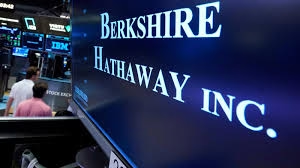Berkshire Hathaway reported record cash reserves of $381.7 billion in its latest quarterly results, signaling continued caution toward markets even as profits rose. This marks the company’s final financial report before Warren Buffett steps down as CEO.
For the 12th consecutive quarter, Berkshire sold more stocks than it purchased, maintaining a conservative stance despite a $283.2 billion equity portfolio that includes major holdings such as Apple and American Express.
The conglomerate did not repurchase any shares for the fifth straight quarter, even though its stock has underperformed compared to the broader market.
Profit rises, driven by insurance and rail units
Berkshire’s third-quarter operating profit jumped 34% to $13.49 billion, surpassing estimates, while net income rose 17% to $30.8 billion. Lower insurance losses and the absence of major natural disasters supported earnings growth.
However, overall revenue grew just 2%, trailing the broader U.S. economy. The company cited economic uncertainty and lower consumer confidence as key drags, impacting units such as Clayton Homes, Duracell, Fruit of the Loom, and Jazwares (maker of Squishmallows).
Buffett to step down; Greg Abel to take over
At 95, Warren Buffett is preparing to end his six-decade tenure as Berkshire’s CEO by year-end. Vice Chairman Greg Abel, 63, will assume leadership while Buffett remains chairman.
Abel is seen as a more hands-on leader, and his first major decisions could involve how to use Berkshire’s growing cash pile. Options include potential acquisitions or possibly initiating the company’s first dividend since 1967.
Berkshire recently agreed to use $9.7 billion in cash to purchase Occidental Petroleum’s OxyChem chemicals business, announced on October 2.
Mixed performance across businesses
Insurance operations saw mixed results. Geico reported lower profits amid higher spending to attract new policyholders. Lower interest rates also weighed on returns from Berkshire’s large cash holdings.
The BNSF railroad reported a 6% profit increase, driven by reduced fuel costs and higher employee productivity. Meanwhile, Berkshire Hathaway Energy saw a 9% decline in profit due to wildfire-related legal costs and higher expenses in its natural gas and UK power operations.
Berkshire is still assessing how the U.S. administration’s One Big Beautiful Bill Act signed in July could affect its renewable energy ventures.
Stock performance trails S&P 500
Since Buffett’s May 3 announcement of his retirement plans, Berkshire’s stock has fallen 12%, underperforming the S&P 500 by 32 percentage points. For 2025 overall, it remains 11 points behind the index.
Despite short-term pressure, long-time investors remain confident that Berkshire’s disciplined approach and strong fundamentals will sustain its long-term value.
The Omaha-based conglomerate owns nearly 200 businesses, spanning insurance, railroads, energy, manufacturing, and consumer brands such as Dairy Queen and See’s Candies. Berkshire’s last major acquisition was Precision Castparts for $32.1 billion in 2016.
Disclaimer: This article is for informational purposes only and does not constitute investment advice. Investors should perform their own due diligence before making financial decisions.

